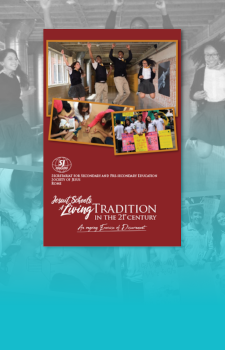5. Jesuit Schools are committed to Justice
- In 1974, the Society of Jesus published Decree 4 of the documents of the 32nd General Congregation. It stated, “The mission of the Society of Jesus today is the service of faith, of which the promotion of justice is an absolute requirement.” That mission has been reaffirmed by subsequent General Congregations 33, 34, and 35.
- The mission has featured prominently in the teachings of Superiors General Arrupe, Kolvenbach, Nicolas and Sosa. The mission has been articulated in documents produced by Jesuit assistancies and conferences worldwide, by provinces and by Jesuit communities and institutions.
- Indeed, in The Contemplation to Attain Divine Love, at the heart of the Spiritual Exercises, Saint Ignatius teaches that love ought to be put more in deeds than in words.
- The commitment to social justice is not marginal to the mission; it is at the heart. [55]
- In his encyclical Evangelii gaudium, Pope Francis underlined that work for justice is a sine qua non for a community committed to authentic faith:
- “An authentic faith – which is never comfortable or completely personal – always involves a deep desire to change the world, to transmit values, to leave this earth somehow better than we found it. We love this magnificent planet on which God has put us, and we love the human family that dwells here, with all its tragedies and struggles, its hopes and aspirations, its strengths and weaknesses. The earth is our common home and all of us are brothers and sisters. If indeed the just ordering of society and of the state is a central responsibility of politics, the Church cannot and must not remain on the sidelines in the fight for justice.” [56]
- Manifested in the term “Men and women with and for others,” Jesuit education should provide opportunities for students to:
- a. Form hearts open to the suffering of others through direct contact;
- b. Develop a critical consciousness to understand the root causes of inequality and oppression;
- c. Gain competence to effect positive change in the local culture and the world;
- d. Acquire courage to be steadfast in the face of misunderstanding and criticism.
- Our schools should:
- Honor the Catholic commitment to just wages and the dignity of work in salaries, provision of health care, parental leave, and tuition benefits;
- Encourage alumni to adhere to the demands of social justice:
- By engaging in fair labor practices;
- Holding a preferential option for the poor in their business dealings and civil activities;
- Form partnerships that narrow the gap of our own educational networks “for the poor” and “for the middle- and high-classes” that have grown separately, reproducing our societies’ segregation.
- In this sense we should accept the invitation and challenge of Fr. General Kolvenbach: “We should require all our students to use the option for the poor as a criterion, so that they never make an important decision without first thinking how it can affect those who occupy the last place in society.” [57]
Exercise 23. For discernment:
- How do you assess this challenge?
- What are the most significant obstacles?
- How can we adapt this challenge for all Jesuit schools so that it reflects the greater good?
- In this context, what has your educational apostolate done?
- What should your educational apostolate be doing?
Complementary Resources for this Global Identifier
Login or Join
to create and view comments

